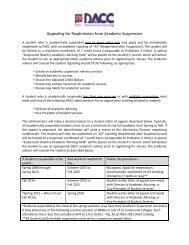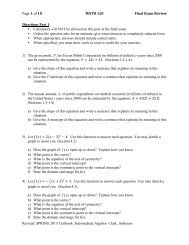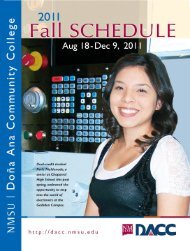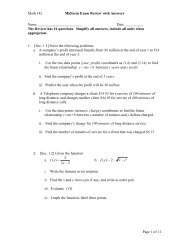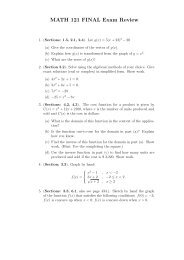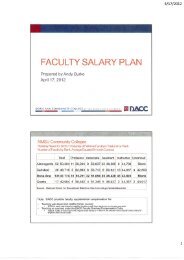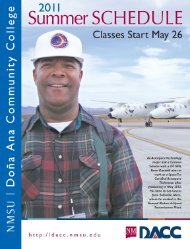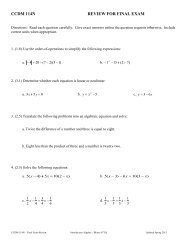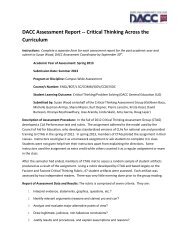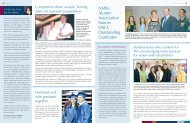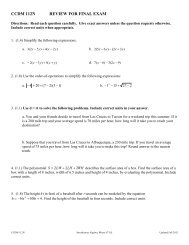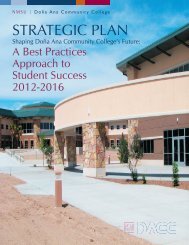DACC Catalog - Dona Ana Community College - New Mexico State ...
DACC Catalog - Dona Ana Community College - New Mexico State ...
DACC Catalog - Dona Ana Community College - New Mexico State ...
Create successful ePaper yourself
Turn your PDF publications into a flip-book with our unique Google optimized e-Paper software.
2012-2013 Student Handbook 1172 ADMINISTRATION OF DISCIPLINEThe responsibility of administering the discipline system is delegated by the Presidentof Doña <strong>Ana</strong> <strong>Community</strong> <strong>College</strong> to the Vice-President for Student Servicesfor nonacademic discipline and to the Vice-President for Academic Affairs foracademic discipline. In turn, these individuals may delegate authority to othergroups or individuals for handling violations of the Student Code of Conduct. Allactivities shall be monitored by a central administrative authority to ensure fairnessand consistency. All discipline sanctions imposed campus-wide will be reported tothe Vice-President for Student Services for record-keeping purposes.Doña <strong>Ana</strong> <strong>Community</strong> <strong>College</strong> attempts to handle discipline matters at the lowestpossible level by recognizing a variety of Hearing Officers. Each Hearing Officer isa <strong>DACC</strong> Official who is an administrator, faculty member, or staff member such as aDepartment Chairperson or Professional Staff Member. Hearing Officers adjudicatecases when violations are alleged. The Hearing Officer is authorized to exercise activecontrol over the proceedings in order to elicit relevant information, to avoid needlessconsumption of time, and to prevent the harassment or intimidation of witnesses.Disciplinary regulations at Doña <strong>Ana</strong> <strong>Community</strong> <strong>College</strong> are set forth in writing inorder to give students general notice of prohibited conduct. These rules and regulationsshould be read broadly and are not designed to define prohibited conduct inexhaustive terms. It is recognized by <strong>New</strong> <strong>Mexico</strong> <strong>State</strong> University and Doña <strong>Ana</strong><strong>Community</strong> <strong>College</strong> that students are adults and are expected to obey the law andtake personal responsibility for their conduct. A student is therefore subject to twosources of authority, civil/criminal authority and NMSU-<strong>DACC</strong> authority. Violationof any municipal ordinance, law or regulation of the <strong>State</strong> of <strong>New</strong> <strong>Mexico</strong>, or lawor regulation of the United <strong>State</strong>s which may cause harm or endangerment to selfor others, or somehow compromises the educational mission of the <strong>College</strong> or University,may result in disciplinary action. The <strong>College</strong>/University does not normallytake disciplinary action for off-campus violations, but it retains the right to act inspecial cases. Disciplinary action imposed by NMSU-<strong>DACC</strong> may precede, andbe in addition to, any penalty that might be imposed by an off-campus authority.When accused of a violation, the student has the right to review the evidence againsthim or her, but this does not necessarily mean the right to confront a witness. Attorneyswill not be allowed to attend or participate in hearings.The procedures to be followed in matters of academic and nonacademic misconductdiffer and are outlined in the following sections. In exceptional cases of academicmisconduct, the “Procedures for Dealing with Cases which May Result in Expulsionor Degree Revocation” will be followed instead, and may be found in the AdministrativePolicy and Procedures Manual, or may be obtained in the Office of the VicePresident for Student Services.3 ACADEMIC MISCONDUCT3.1 Persons and/or groups involved in Academic Discipline Cases3.1.1 Vice-President for Academic Affairs—When an academic violation occurs,the Vice President for Academic Affairs (or a designee) will dispose of anyviolations referred or appealed to the Dean’s Office.3.1.2 Academic Appeals Board—A student appeals board shall be establishedfor each academic year as a standing committee consisting of three (3) facultymembers and two (2) students to be appointed by the Vice-President forAcademic Affairs. In some cases, the Vice-President for Academic Affairs mayconvene the Academic Appeals Board and solicit its recommendation.3.1.3 The decision of the Vice-President for Academic Affairs is final and willbe reported to all parties concerned within three (3) working days under thegeneral process.3.2 Academic Misconduct—Any student found guilty of academic misconductshall be subject to disciplinary action. Academic misconduct includes, but isnot limited to, the following actions:3.2.1 Cheating or knowingly assisting another student in committing an actof cheating or other forms of academic dishonesty;3.2.2 Plagiarism, which is using another person’s work without acknowledgmentand making it appear to be one’s own. Any ideas, words, pictures, orother source material must be acknowledged in a citation that gives credit to thesource. This is true even if the source be another student’s work, unpublisheddocuments, oral statements, or the Internet. Intentional and unintentionalinstances of plagiarism are considered instances of academic misconduct. Itis the responsibility of the student submitting the work in question to know,understand, and comply with this policy. If no citation is given, then borrowingany of the following would be an example of plagiarism:• an idea or opinion, even when put into one’s own words (paraphrase)• a few well-said words, if these are a unique insight• many words, even if one changes most of them• materials assembled by others, for instance quotes or a bibliography• an argument• a pattern of idea• graphs, pictures, or other illustrations• facts• all or part of an existing paper or other resourceThis list is not meant to include all possible examples of plagiarism. See theUniversity Library’s Web page on plagiarism for further examples.3.2.3 Unauthorized possession of examinations, reserve library materials,laboratory materials, or other course-related materials;3.2.4 Unauthorized changing of grades on an examination, in an instructor’sgrade book, or on a grade report; or unauthorized access to academic computerrecords;3.2.5 Nondisclosure or misrepresentation in filling out applications or otherNMSU-<strong>DACC</strong> records in or for academic departments or colleges. Studentswho engage in disruptive activities in an academic setting (e.g., classrooms,academic offices, or academic buildings) are subject to disciplinary action inaccordance with Section 4, “Non Academic Misconduct—All Students.” Suchstudents are also subject to administrative actions in accordance with the <strong>DACC</strong><strong>Catalog</strong>.3.3 Academic Discipline Process—General Cases3.3.1 Course or Departmental Level—For incidents that occur at the courseor academic department level, the faculty member or department chair mustinform the student of the alleged offense within ten (10) working days of itsdiscovery, and after an investigation and/or conference, will take one of thefollowing actions:3.3.1-A The allegation may be dismissed as unfounded;3.3.1-B The allegation may be dismissed for lack of evidence;3.3.1-C The student may admit guilt and a sanction will be imposed;3.3.1-D The Hearing Officer will determine guilt based on preponderanceof the evidence, and a sanction will be imposed; or3.3.1-E The Hearing Officer will report the decision to the student and tothe Vice-President for Academic Affairs.3.3.2 Other Academic Misconduct—For those incidents involving academicmisconduct not at the course level (e.g., falsification of academic records), theVice-President for Academic Affairs, or a designee, will serve as the HearingOfficer and will follow the same process as outlined above.3.3.3 Appeal Process3.3.3-A All possible levels of appeal should be exhausted before a casereaches the Vice-President for Academic Affairs. The student must alwaysbe advised as to the next level of appeal.3.3.3-B A student who wishes to appeal an instructor’s decision may doso by writing to the course department chair (Division Dean, if instructoris also Department Chair) within five (5) working days. The appropriateHearing Officer will consider both sides of the case and report thedecision to the student, the course instructor, the Department Chair, thecorresponding Division Dean, the Vice-President for Academic Affairs,and the Vice-President for Student Services within ten (10) working days.If extenuating circumstances prevent either party from meeting this timeframe, an alternate schedule will be formulated by all parties involved.3.3.3-C Either party may appeal a Department Chair’s decision to the correspondingDivision Dean; however, a request for a formal hearing neednot necessarily be granted. The following points will apply in all cases ofappeal:3.3.3-C1 The appeal must be made in writing to the appropriateappellate person or body within the specified period of time.



